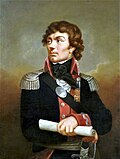Wikipedia:Today's featured article/requests/Tadeusz Kościuszko
Tadeusz Kościuszko
[edit]- The following discussion is an archived discussion of the TFAR nomination of the article below. Subsequent comments should be made on the appropriate discussion page (such as Wikipedia talk:Today's featured article/requests). Please do not modify this page unless you are renominating the article at TFAR. For renominations, please add
{{collapse top|Previous nomination}}to the top of the discussion and{{collapse bottom}}at the bottom, then complete a new {{TFAR nom}} underneath.
The result was: scheduled for Wikipedia:Today's featured article/June 17, 2014 by BencherliteTalk 19:06, 2 June 2014 (UTC)
Tadeusz Kościuszko (1746–1817) was a military leader who became a national hero in Poland, Lithuania, Belarus, and the United States. He graduated from the Corps of Cadets in Warsaw, Poland, before studying in France. In 1776, he moved to North America, where he took part in the American Revolutionary War as a colonel in the Continental Army. An accomplished military architect, he designed and oversaw the construction of state-of-the-art fortifications, including those at West Point, New York. He returned to Poland, and was commissioned a major general in the Polish–Lithuanian Commonwealth Army in 1789. Two years after the Polish–Russian War of 1792 had resulted in the Second Partition of Poland, he led an uprising against Russia in March 1794. Russian forces captured him at the Battle of Maciejowice, and the defeat of the uprising led to the Third Partition in 1795, which ended Poland's independent existence for 123 years. He was pardoned by Tsar Paul I in 1796 and emigrated to the United States. A close friend of Thomas Jefferson, Kościuszko wrote a will in 1798 dedicating his American assets to the education and freedom of U.S. slaves. (Full article...)
- Most recent similar article(s): Don't know of any off hand.
- Main editors: Gwillhickers, Piotrus
- Promoted: Article was promoted May 25, 2014
- Reasons for nomination: first FA to appear, International figure, Famous in United States, Poland and France; Would like to see it appear as soon as it is possible and practical.
- Support as nominator. Gwillhickers (talk) 18:33, 1 June 2014 (UTC)
- Thanks for the nomination; I'll put together a blurb for you. BencherliteTalk 19:12, 1 June 2014 (UTC)
- Blurb done. Welcome to TFAR, and congratulations on your first FA. BencherliteTalk 19:26, 1 June 2014 (UTC)

